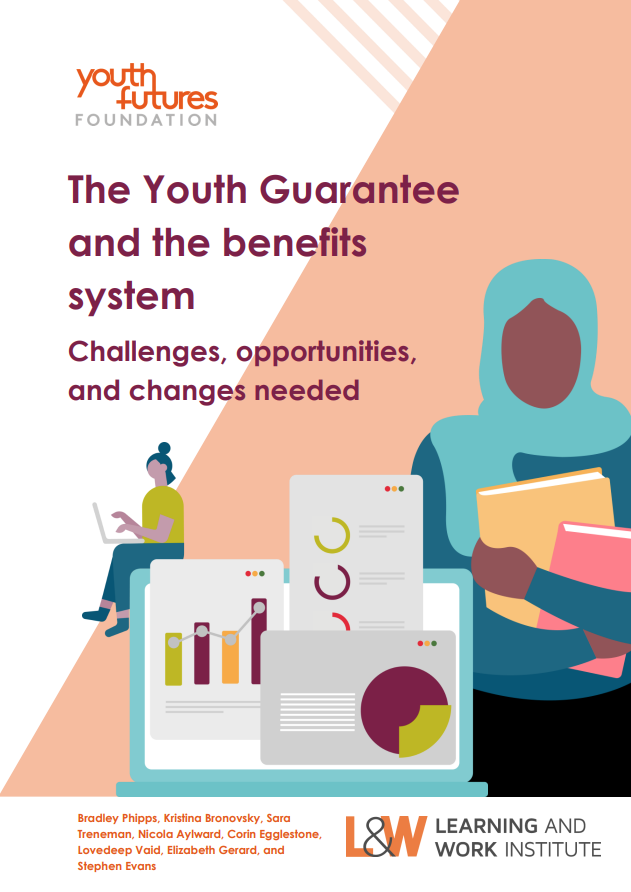Overview
Youth Futures Foundation commissioned Learning and Work Institute to explore the challenges and opportunities the benefits system raises for the Youth Guarantee, and what changes might need to be made to ensure that the benefits system effectively interacts with the Youth Guarantee to support young people.
Executive Summary
Around 948,000 young people in England are not in education, employment or training (NEET), equivalent to one in eight young people, risking harm to their career prospects and the economic prosperity of the country.
Around 250,000 young people who claim Universal Credit (UC) are looking for work but need better support. However, nearly 200,000 are claiming benefits but assessed as too ill to work. These young people have little or no contact with Jobcentre Plus or wider help and should be offered extended support if they want it. There are around 400,000 NEET young people who are not claiming benefits and risk missing out on support altogether. They need dedicated outreach to help them move closer to employment.
Where young people live matters. Over 15% of young people in Blackpool and Hartlepool claim UC and are in the claimant categories ‘required to search for work’ or ‘assessed as too ill to work’.
Simplifying and improving the benefits system and support available will be central to the success of the Youth Guarantee.
The Youth Guarantee in England, announced by the Government in 2024, aims to provide this support to 18- to 21-year-olds and reduce the number of young people who are NEET. The Youth Guarantee, initially through eight pilot trailblazers in different regions, is a commitment to support young people to find a job or learning opportunity. It aims to bring together existing support for young people including free further education provision, apprenticeships, and work-related training such as Skills Bootcamps.
As a social safety net, the benefits system provides financial support for young people who are not currently in work, or not able to work, are on a low income, or meet other criteria that mean they need extra support. The system can also act as a gateway to help people find work and training opportunities. If these two support offers are well integrated, the benefits system could be integral to the success of the Guarantee. However, for this to happen, there are a number of challenges to overcome.
Recommendations
Implementing a number of actions will help to ensure that that the benefits system is effectively integrated with the Youth Guarantee and that it works for young people:
- Change the way that the performance of Jobcentre Plus work coaches is measured to focus on sustained job outcomes, and efforts to improve employability and skills through education and training.
- Have a specialist designated lead and ensure work coaches who support young claimants in every Jobcentre Plus are trained to help young people navigate the system, with dedicated Youth Employment Coaches where appropriate.
- Review the journey for young people through the benefits system, in collaboration with young people, to identify recommendations for change directly from young people.
- Positively promote the Youth Guarantee as an opportunity to help shift perceptions of the benefits system among young people by running a marketing campaign targeted at young people, that focuses on their strengths and potential.
- Ensure that young people can access good support through the benefits system regardless of their age, health conditions, or where they live.
- Remove the delay in access to the health element of Universal Credit until someone is aged 22, to help ensure equity in support provided to young people and adults with health conditions. The Government could also review the lower rate of the standard allowance of Universal Credit for people under-25.
- Raise awareness of existing support and schemes available through the benefits system, including the Flexible Support Fund, benefits calculators and ‘right to try’, that will allow people who claim disability benefits to try work without being reassessed for their benefits.
- Improve how the benefits system supports skills and progression, including trialling recognising education and training as fulfilling work search requirements for Universal Credit.




